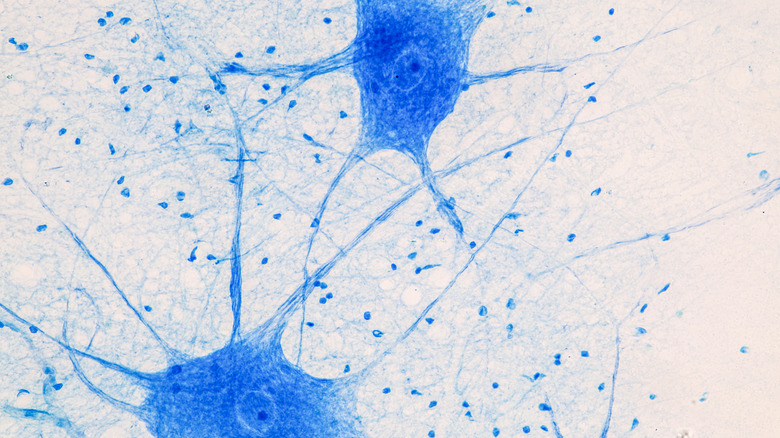What A Concussion Really Does To Your Brain
After a car accident, sports injury, or fall, you may feel sleepy, get a headache, or struggle with memory. If so, you might have a concussion. So what's happening inside your brain?
A concussion is a mild traumatic brain injury (mTBI), meaning it injures the brain at only a cellular level, but not at both a cellular and structural level like a traumatic brain injury (TBI), according to Concussion Alliance. A blow to the head can cause the brain to knock against the skull, disrupting brain function and causing damage.
No two concussions are alike, so symptoms may vary widely, and someone may even appear totally fine (via Brainline). However, there are some typical symptoms: sensitivity to light and sound, headaches, memory loss, irritability, problems with balance, sleep issues, and hormonal changes. It's recommended to see a medical provider if you suffer from trauma to the head followed by any of these symptoms.
Just as concussions aren't predictable, neither is recovery. It can look different for everyone, but according to the 2017 Concussion in Sport Group consensus statement, recovery can take 10 to 14 days for adults and up to one month for children 18 and under.
What's happens to the brain during concussion?
Our brains are made up of important cells called neurons, which allow our bodies to perform tasks like making a cup of coffee and feeling joy (via Concussion Alliance). These neurons are connected by pathways called axons, which act like arms reaching out to allow communication between neurons. When you suffer from a sudden injury to the head, your brain shakes like Jell-O inside your head as it comes to rest. This causes the neurons to stretch out and sometimes break, causing problems with communication between cells; this cellular damage makes it difficult for the brain to do its job, leading to concussion symptoms.
According to 2013 review published in the Canadian Medical Association Journal, once you suffer from a concussion, you're more susceptible to experiencing another. Subsequent concussions can happen more easily and can take longer to heal. There also may be a genetic factor, indicating that females might be more prone to concussions than males.
While they may seem relatively harmless, concussions are nothing to be complacent about. Seek medical care immediately if you suspect a possible concussion.


